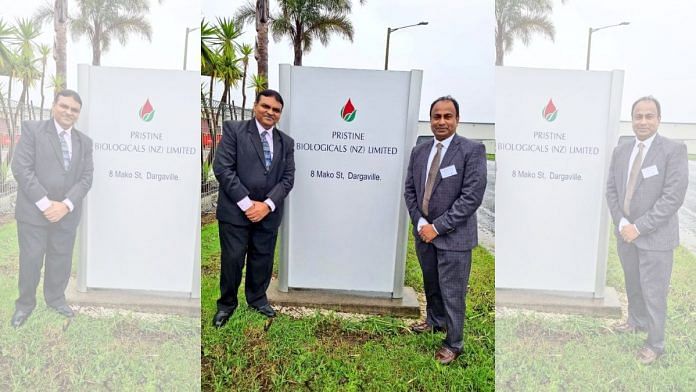New Delhi: Pristine Biologicals (NZ) Limited, a subsidiary of vaccine-manufacturer Indian Immunologicals Ltd (IIL), has set up a new facility for the production of bovine serum in New Zealand’s Dargaville.
Bovine or cattle serum is a key reagent — a substance or compound that can facilitate a reaction — required for the production of vaccines. It comprises the white liquid that is left when red blood cells are removed from blood.
The new facility in New Zealand was inaugurated Monday by Meenesh C. Shah, chairman of IIL and National Dairy Development Board (NDDB), in the presence of Jason Smith, mayor of Dargaville, Dr K. Anand Kumar, managing director of IIL, and Vijay Dasari, general manager and director of Pristine Biologicals, among others.
“I am glad that an investment made overseas by IIL has come good. The affordable vaccines made in India required a sustainable supply of quality ingredients made by Pristine,” Shah said in a statement.
Headquartered in Hyderabad, IIL is one of the largest producers of vaccines in Asia. It was set up by the NDDB in 1982 and specialises in the development of various types of vaccines.
Bovine serum is used in research laboratories that work with cell and tissue cultures. Animal blood contains essential molecules required for cells to grow. Even though efforts to find alternatives are underway, scientists have been unable to grow good quality cells in laboratories without the use of bovine serum.
The use of bovine serum has been especially relevant during the Covid-19 pandemic. India’s indigenously developed Covid-19 vaccine, Covaxin, was also developed using bovine serum. Bovine serum is a by-product of the beef industry. Companies collect blood when the animals are slaughtered for meat.
Also Read: Scientists say it’s theoretically possible to communicate with extraterrestrial beings
Why serum from New Zealand, Australia are in demand
IIL is the world’s largest manufacturer of Foot and Mouth Disease (FMD) vaccines — a fatal viral disease that affects cloven-hoofed animals. For its production, the company needs bovine serum from a country where antibodies against FMD are not prevalent in the animal population. Serum from New Zealand and Australia have premium value since these countries are free from FMD.
The serum is used as a medium for growing cells, which in turn are used to grow viruses. The virus is then harvested and weakened or deactivated for use as vaccines.
A senior official of IIL told ThePrint that if the serum itself has antibodies, the virus will not be able to grow.
Pristine Biologicals has been able to produce and supply several hundred tonnes of quality serum to IIL and other countries, a statement released by the company said.
Moreover, due to the strict laws around cattle slaughter in several Indian states, bovine serum is usually imported by Indian laboratories.
“Many vaccine manufacturers in India have expressed difficulty in obtaining quality serum and have sought the help of IIL through the government,” the statement added.
IIL exporting cattle blood serum to India since 2016
A statement released by IIL earlier had said that it requires about 200 tonnes of serum, most of which is procured from New Zealand and Australia.
It was in 2015 that IIL decided to end its dependence on foreign companies and set up Pristine Biologicals in New Zealand with an investment of $1 million. The company has been exporting bovine blood serum to India since 2016.
According to reports from Australian media from 2015, Pristine Biologicals had entered into a long-term partnership with Silver Fern Farms — a meat company in New Zealand.
(Edited by Myithili Hazarika)
Also Read: Top anti-diabetic drug to get cheaper by a third of current price as it goes off patent



